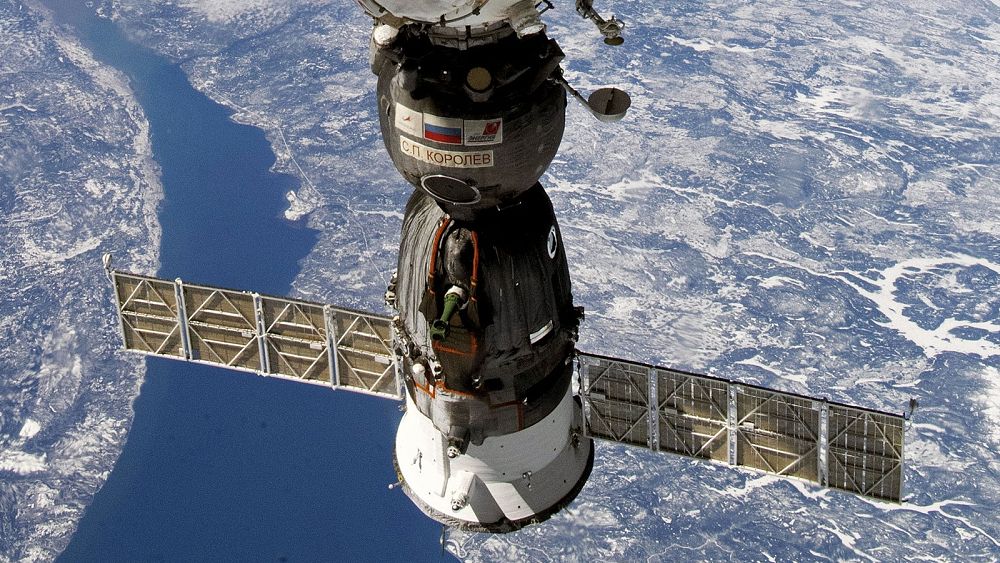
Russia said on Wednesday it would launch another Soyuz spacecraft next month to bring home two of its own cosmonauts and a US astronaut from the International Space Station after their original capsule was struck by a micrometeoroid and started leaking.
The last month's leak came from a tiny puncture — less than 1 millimetre wide — on the external cooling system of the Soyuz MS-22 capsule, one of two return capsules docked to the ISS that can bring crew members home.
"Having analysed the condition of the spacecraft, thermal calculations and technical documentation, it has been concluded that the MS-22 must be landed without a crew on board," said Yuri Borisov, the head of the Russian space agency Roscosmos.
Russia said a new capsule, Soyuz MS-23, would be sent up on 20 February from the Baikonur cosmodrome in Kazakhstan to replace the damaged Soyuz MS-22, which will be returned to Earth empty. The new capsule will have to fly to the ISS in autopilot mode, too.
The original plan was to launch the MS-23 in March with two Russians and one American, replacing the three already up there. This new crew will now have to wait until late summer or fall to fly when another capsule is ready for them.
The crew is 'safe on board the space station', NASA says
Russian cosmonauts Sergey Prokopyev and Dmitry Petelin and US astronaut Francisco Rubio had been due to end their mission in March but will now extend it by a few more months and return aboard the MS-23.
"They are ready to go with whatever decision we give them," Joel Montalbano, NASA's ISS program manager, told a news conference. "I may have to fly some more ice cream to reward them," he added.
If there is an emergency in the meantime, Roscosmos said it would look at whether the MS-22 spacecraft can be used to rescue the crew. In this scenario, temperatures in the capsule could reach unhealthy levels of 30-40 degrees Celsius.
"In case of an emergency, when the crew will have a real threat to life on the station, then probably the danger of staying on the station can be higher than going down in an unhealthy Soyuz," Sergei Krikalev, Russia's chief of crewed space programs, said.
NASA took part in all the discussions and agreed with the plan.
“Right now, the crew is safe on board the space station,” said NASA's space station program manager Joel Montalbano. “There’s no immediate need for the crew to come home today.”
There are a total of seven space station residents, and the crew can not rely on the MS-22 if they encounter another emergency, like a fire or decompression.
Besides Prokopyev, Petelin and Rubio, the space station is home to NASA astronauts Nicole Mann and Josh Cassada, Russia's Anna Kikina and Japan's Koichi Wakata, who rode up on a SpaceX capsule last October.
NASA said it was looking at the possibility of adding extra crew to the capsule — the only other "lifeboat" vehicle currently docked at the station.
'We are prepared for this situation', Roscosmos says
The incident has disrupted Russia's ISS activities, forcing its cosmonauts to call off spacewalks as officials focused on the leaky capsule.
Both NASA and Roscosmos believe the leak was caused by a micrometeoroid — a small particle of space rock — hitting the capsule at high velocity.
"Space is not a safe place, and not a safe environment. We have meteorites, we have a vacuum and we have a high temperature and we have complicated hardware that can fail," Krikalev said.
"Now we are facing one of the scenarios ... we are prepared for this situation."
The issue comes during the 11th month of Russia's war against Ukraine, which sparked the biggest crisis in relations between Moscow and the West since the 1962 Cuban Missile Crisis.
Moscow has used its space program since the February invasion to show support for its troops.
The Soyuz rocket launched in March 2022 was decked out with a large letter "Z", known as the main symbol of Russia's aggression against its neighbour.
In early July of 2022, cosmonauts Oleg Artemyev, Denis Matveyev and Sergey Korsakov shared photos of themselves aboard the ISS holding the flags of the so-called "people's republics" of Donetsk Luhansk, two territories in Ukraine's Donbas that Russia has since unilaterally annexed despite protests by the international community.
On 21 December, Roscosmos' former director and a close ally of Russian President Vladimir Putin, Dmitry Rogozin, was critically wounded while celebrating his birthday in Moscow-occupied Donetsk.
Rogozin, who was replaced at the helm of Russia's national space agency on 16 July 2022, is known as one of the most fervent supporters of the war in Ukraine.
The new chief, Yuri Borisov, previously said that Russia plans to pull out of the ISS programme in 2024 and build its own space station down the line.
Neither Roscosmos nor NASA made any comments regarding the ongoing tensions between Moscow and Washington in the context of the Soyuz crisis.
https://news.google.com/__i/rss/rd/articles/CBMiaGh0dHBzOi8vd3d3LmV1cm9uZXdzLmNvbS8yMDIzLzAxLzEyL3J1c3NpYS10by1zZW50LW5ldy1zb3l1ei1jYXBzdWxlLWFmdGVyLWlzcy1kYW1hZ2VkLWJ5LXRpbnktbWV0ZW9yb2lk0gEA?oc=5
2023-01-12 12:11:24Z
1730620237
Tidak ada komentar:
Posting Komentar